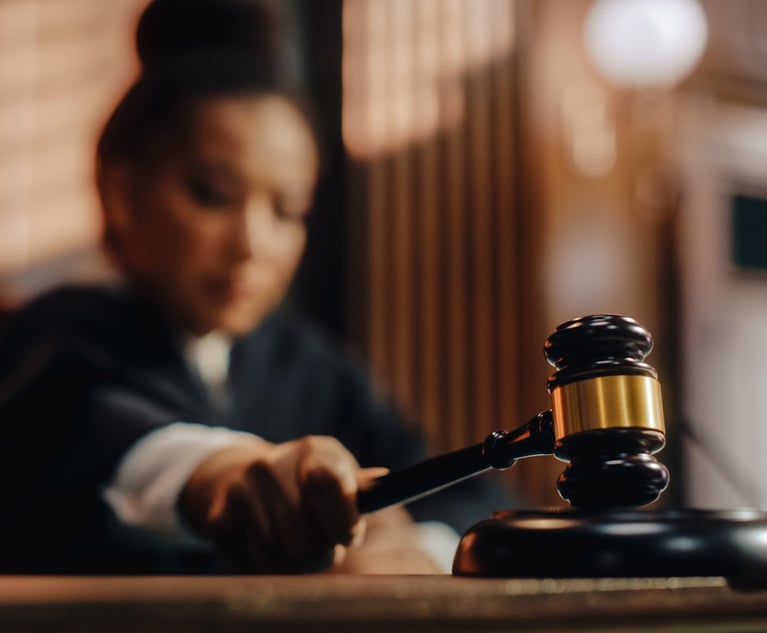Judge Confirms $50.3M Infringement Verdict for Pa. Glassmaker
A Delaware federal judge on Thursday confirmed a $50.3 million infringement verdict against Ardagh Glass Inc. for infringing a patent held by a small Pennsylvania-based glass company.
March 09, 2018 at 04:34 PM
4 minute read
The original version of this story was published on Delaware Business Court Insider
 U.S. District Judge Gregory M. Sleet of the District of Delaware.
U.S. District Judge Gregory M. Sleet of the District of Delaware.
A Delaware federal judge on Thursday confirmed a $50.3 million infringement verdict against Ardagh Glass Inc. for infringing a patent held by a small Pennsylvania-based glass company.
In a 28-page memorandum opinion, U.S. District Judge Gregory M. Sleet of the District of Delaware turned away Ardagh's attack on a Wilmington jury's finding last April that an American subsidiary of the European glass manufacturer willfully infringed Green Mountain Glass' patent, which covers technology used to recycle glass in the manufacturing process.
Though Sleet tacked another $12 million in prejudgment interest onto the original verdict, he declined Green Mountain's request for enhanced damages.
Ardagh said Friday that it planned to “vigorously appeal” the ruling.
“Ardagh continues to disagree with the jury verdict and strongly believes that the case is without merit,” the company said in a statement.
In court documents, Green Mountain said it acquired the so-called '737 patent in 1998 to reuse mixed-colored recycled glass, or cullet, in the glassmaking process. Cullet is prized in the industry for its ability to save energy, reduce emissions and extend glass furnace life.
Green Mountain, based in Bryn Mawr, Pennsylvania, accused Ardagh in 2014 of willfully infringing its product after company officials met over a period of years to discuss the technology. According to Green Mountain, Ardagh's brass knew Green Mountain held the patent for recycling mixed-color cullet, but still went ahead and used the technology without a license.
According to Sleet's opinion, Ardagh did not dispute that it used similar methods. Rather, it argued in its post-trial briefing that the jury overlooked prior patents, which would have prevented a finding of infringement.
However, Sleet said he warned Ardagh during trial that its prior use of the technology could “seriously undermine” its standing in the eyes of the jury, but Ardagh opted to press ahead with its anticipation defense anyway.
“Despite this warning, defendant proceeded with their defense. Accordingly, a reasonable jury could have found infringement based on all the aforementioned evidence,” he wrote.
Sleet also said he gave “much thought” to inappropriate comments that Green Mountain's lawyers made in front of the jury.
According to the opinion, a Green Mountain attorney pressed a lay witness on claim construction, closing his questioning by saying, ”You have just proven infringement … correct?” Though the remark earned the attorney a rebuke from the bench, counsel for Green Mountain repeated the statement again in his closing, Sleet said.
Sleet immediately instructed jurors to disregard the comments.
Ardagh said the statements amounted to egregious misconduct by Green Mountain. The company asked Sleet for a new trial, arguing the plaintiff's conduct swayed the jury on the issue of infringement.
But Sleet cited the instructions, and his admonishment of Green Mountain's attorneys in denying the request.
“While counsel behaved inappropriately and unprofessionally at this and other times during the trial, after much thought the court believes its curative instructions sufficed to adequately ameliorate the harm caused by counsel,” he said.
Matthew R. Berry, an attorney for Green Mountain, praised the ruling Friday, but declined to comment further.
“We are grateful that the court affirmed the verdict and awarded our prejudgment interest request,” said Berry, a partner in Susman Godfrey's Seattle office.
Green Mountain did not comment on the ruling.
The case is captioned Green Mountain Glass v. Saint-Gobain Containers.
This content has been archived. It is available through our partners, LexisNexis® and Bloomberg Law.
To view this content, please continue to their sites.
Not a Lexis Subscriber?
Subscribe Now
Not a Bloomberg Law Subscriber?
Subscribe Now
NOT FOR REPRINT
© 2025 ALM Global, LLC, All Rights Reserved. Request academic re-use from www.copyright.com. All other uses, submit a request to [email protected]. For more information visit Asset & Logo Licensing.
You Might Like
View All

'Discordant Dots': Why Phila. Zantac Judge Rejected Bid for His Recusal
3 minute read
Phila. Court System Pushed to Adapt as Justices Greenlight Changes to Pa.'s Civil Jury Selection Rules
5 minute read
Pa. Appeals Court: Trial Judge Dismissed Med Mal Claims Without Giving Plaintiffs Proper Time to Fight Back
4 minute readTrending Stories
Who Got The Work
J. Brugh Lower of Gibbons has entered an appearance for industrial equipment supplier Devco Corporation in a pending trademark infringement lawsuit. The suit, accusing the defendant of selling knock-off Graco products, was filed Dec. 18 in New Jersey District Court by Rivkin Radler on behalf of Graco Inc. and Graco Minnesota. The case, assigned to U.S. District Judge Zahid N. Quraishi, is 3:24-cv-11294, Graco Inc. et al v. Devco Corporation.
Who Got The Work
Rebecca Maller-Stein and Kent A. Yalowitz of Arnold & Porter Kaye Scholer have entered their appearances for Hanaco Venture Capital and its executives, Lior Prosor and David Frankel, in a pending securities lawsuit. The action, filed on Dec. 24 in New York Southern District Court by Zell, Aron & Co. on behalf of Goldeneye Advisors, accuses the defendants of negligently and fraudulently managing the plaintiff's $1 million investment. The case, assigned to U.S. District Judge Vernon S. Broderick, is 1:24-cv-09918, Goldeneye Advisors, LLC v. Hanaco Venture Capital, Ltd. et al.
Who Got The Work
Attorneys from A&O Shearman has stepped in as defense counsel for Toronto-Dominion Bank and other defendants in a pending securities class action. The suit, filed Dec. 11 in New York Southern District Court by Bleichmar Fonti & Auld, accuses the defendants of concealing the bank's 'pervasive' deficiencies in regards to its compliance with the Bank Secrecy Act and the quality of its anti-money laundering controls. The case, assigned to U.S. District Judge Arun Subramanian, is 1:24-cv-09445, Gonzalez v. The Toronto-Dominion Bank et al.
Who Got The Work
Crown Castle International, a Pennsylvania company providing shared communications infrastructure, has turned to Luke D. Wolf of Gordon Rees Scully Mansukhani to fend off a pending breach-of-contract lawsuit. The court action, filed Nov. 25 in Michigan Eastern District Court by Hooper Hathaway PC on behalf of The Town Residences LLC, accuses Crown Castle of failing to transfer approximately $30,000 in utility payments from T-Mobile in breach of a roof-top lease and assignment agreement. The case, assigned to U.S. District Judge Susan K. Declercq, is 2:24-cv-13131, The Town Residences LLC v. T-Mobile US, Inc. et al.
Who Got The Work
Wilfred P. Coronato and Daniel M. Schwartz of McCarter & English have stepped in as defense counsel to Electrolux Home Products Inc. in a pending product liability lawsuit. The court action, filed Nov. 26 in New York Eastern District Court by Poulos Lopiccolo PC and Nagel Rice LLP on behalf of David Stern, alleges that the defendant's refrigerators’ drawers and shelving repeatedly break and fall apart within months after purchase. The case, assigned to U.S. District Judge Joan M. Azrack, is 2:24-cv-08204, Stern v. Electrolux Home Products, Inc.
Featured Firms
Law Offices of Gary Martin Hays & Associates, P.C.
(470) 294-1674
Law Offices of Mark E. Salomone
(857) 444-6468
Smith & Hassler
(713) 739-1250





